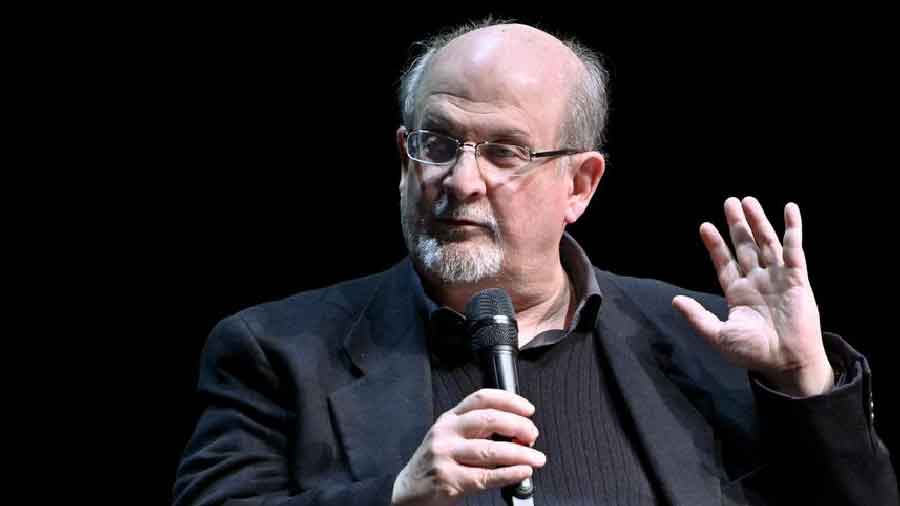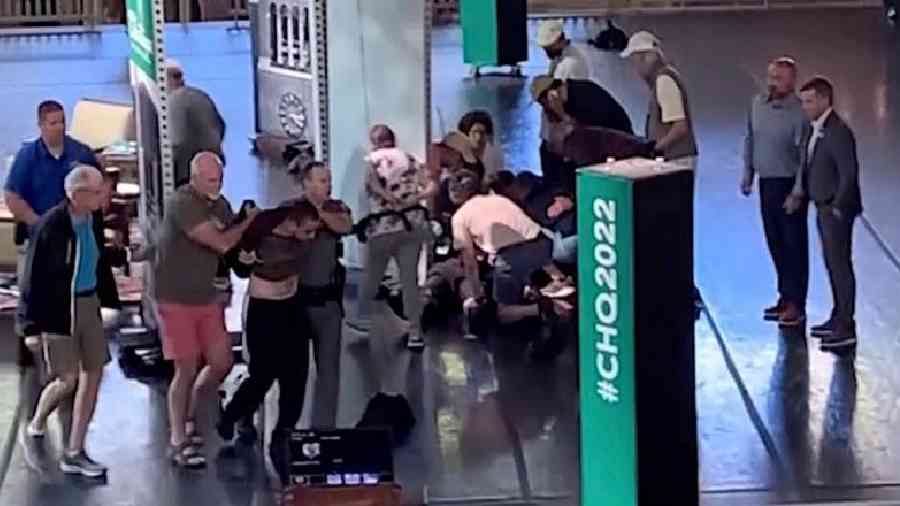It is now a long time since I jumped into a taxi on January 14, 1989, and went to Salman Rushdie’s home at 41 Peter Street, in Islington, north London.
Earlier that day, a copy of The Satanic Verses had been burnt in a public square in Bradford. I was seeking the author’s reaction to the book burning. I was getting worried that his phone was constantly engaged.His house was all boarded up from the inside but the explanation was an innocent one.“Sorry, my phone had come off the hook,” he apologised.For many years, I became practically a full-time Rushdie correspondent. From the summer of 1988 onwards, I knew The Satanic Verses was going to cause trouble even before it was published in the UK by Viking Penguin on September 26, 1988.
The book was going to be brought out in India by Penguin India ahead of the UK — and then word came that India was “not going to touch the book”.I provided tips about the gathering storm to Tony Bambridge, managing editor of The Sunday Times, London, where I was then working.“Just a little immigrant story,” he said dismissively.
Back in Bombay, Rushdie’s home city, Rahul Singh, a close friend then editing The Sunday Observer, had been planning to carry some extracts from The Satanic Verses but changed his mind after realising its possible consequences.I tried to get to the bottom of whether Rahul’s father, Khushwant Singh, editorial adviser to Penguin India, really had sent a fax to Peter Meyer, chief executive of Viking Penguin in London, advising him not to publish the book. In his book (Joseph Anton: A Memoir, Jonathan Cape), Rushdie insisted no such advice was given or, at least, received.
But I believe Khushwant did pass on his misgivings and urged London to think again about bringing out the book.In The Sunday Times, I did a few stories on hostile reaction from several Muslims to the book. About 20 photocopied pages were being faxed around the world. Iran was also my responsibility since I had lived there as a young reporter for The Daily Telegraph.Sometimes, I would go and see Khomeini in the Holy City of Qom. Later, I would come across him in the mountains beyond north Tehran where he was moved for health reasons. I never did a one-to-one with Khomeini — all I was allowed to do was sit in with his followers and listen to him deliver his sermons.Khomeini’s fatwa came on February 14, 1989. That evening, BBC TV led with the report. The next morning, Bambridge, the managing editor of The Sunday Times, came with fresh instructions from Andrew Neil. “The editor wants to do a four-page special report. Knock out everything you have got in your notes.”Between the summer of 1988 and February 14, 1989, I had built up a bulging file. One of the Muslim “community leaders” in Britain, Dr Kalim Siddiqui, told me that he was in Tehran on February 13, 1989, and just about to catch a Lufthansa flight back to London. At Mehrabad airport, he was consulted by the national guidance minister since Khomeini had seen TV reports of five protesters being shot dead in Islamabad.
“Oh, Rushdie, very bad man,” Siddiqui said he told the minister.The latter rushed back, told Khomeini who called a secretary and dictated a statement, which was then rushed to Tehran Radio for the main 2pm bulletin. In such a fashion then, on the say-so of “Brother Kalim” (as he would have it), was the fatwa born.
Rushdie had to disappear for 10 years.In September 2001, after being briefed by the Iranian government at a very senior level, I wrote a story which Rushdie mentioned in his memoirs: “A decade on, the Rushdie crisis is over.”Basically it said: “The shadow of the fatwa, which Ayatollah Khomeini imposed on the author of The Satanic Verses on Feb 14, 1989, can never be lifted because Khomeini, the only man who could have done so, died a few months later. But Iranian governments have made clear to Britain for several years that Tehran has no intention of sending death squads abroad in search of the author.”It was a fudge which both the Iranian and British governments accepted and moved on.
The fatwa would have “theological validity” but would not be implemented in practice.In literary circles in Britain, Midnight’s Children is considered possibly the most important book to come out of India in 75 years. It won the Booker Prize in 1981 and the “Best of the Bookers” in 1993 and 2008.The attack on Rushdie in New York state has caused a genuine sense of shock in Britain, which was his home, after all, for a big part of his life before he moved in 2000 to a new life in America where he felt he would be safer.He first came to the UK from Bombay, his city of birth, as a schoolboy at Rugby, went on to King’s College, Cambridge, made his name with Midnight’s Children in 1981, provoked fury with The Satanic Verses in 1988 and stayed in hiding for 10 years after the fatwa.
Prime Minister Boris Johnson reflected popular sentiment in Britain when he said he was “appalled that Sir Salman Rushdie has been stabbed while exercising a right we should never cease to defend”.The two Tory leadership candidates did likewise. Rishi Sunak expressed his shock and described the 75-year-old author as “a champion of free speech and artistic freedom”, while foreign secretary Liz Truss condemned the “disgraceful attack on Sir Salman Rushdie” and said that “people must be able to speak freely and freedom of speech must be defended”.
In June this year, in the Honour’s List to mark the Queen’s Platinum Jubilee, Rushdie was appointed a “Companion of Honour”, of which there are only 65. This is a very high honour in the British caste system.Back in 2007, Mr Salman Rushdie became “Sir Salman Rushdie” and went to Buckingham Palace the following year to be formally knighted by the Queen for “services to literature”.One thing might seem odd.
The BBC and the rest of the British media are now running profiles of the author, seeking to answer the question: “Who is Salman Rushdie?”But perhaps this isn’t odd at all. More than 34 years have passed since The Satanic Verses controversy became headline news. It is worth stressing that his alleged attacker, Hadi Matar, 24, from Fairview, New Jersey, wasn’t even born when the “Rushdie crisis” lit a fire across the Islamic world.By and by, Rushdie moved to New York, where I went to see him in late 2002 just before Midnight’s Children was staged as a play by the Royal Shakespeare Company in 2003 at the Barbican in London.He told me he hoped Midnight’s Children, the play, would be seen in India.
“One of the things I’ve thought about Midnight’s Children is that it is a novel which puts a Muslim family at the centre of the Indian experience. At a moment when the experience of the minorities in India is marginalised by the rhetoric of Hindu nationalism, it seems relevant. It’s not a particularly religious Muslim family, but it’s a Muslim family and it puts the story of the Muslim family as the centre of the Indian story. That is something that has value right now.”We met again in December 2012 when he came to London to promote the film version of Midnight’s Children, which Deepa Mehta had directed and for which he had written the screenplay.He expressed concern at the direction India was taking. “I am very worried,” he said. “I also think that the area of free speech is very eroded in India now — it seems like there are almost constant attacks on forms of expression whether it is a cartoonist or a painter or a filmmaker or a university scholar or a writer…. For goodness sake, India has such a powerful tradition of political cartooning that the idea that suddenly it is something you can be jailed for is very worrying. The failure of the Indian State to protect those freedoms is very worrying.”











